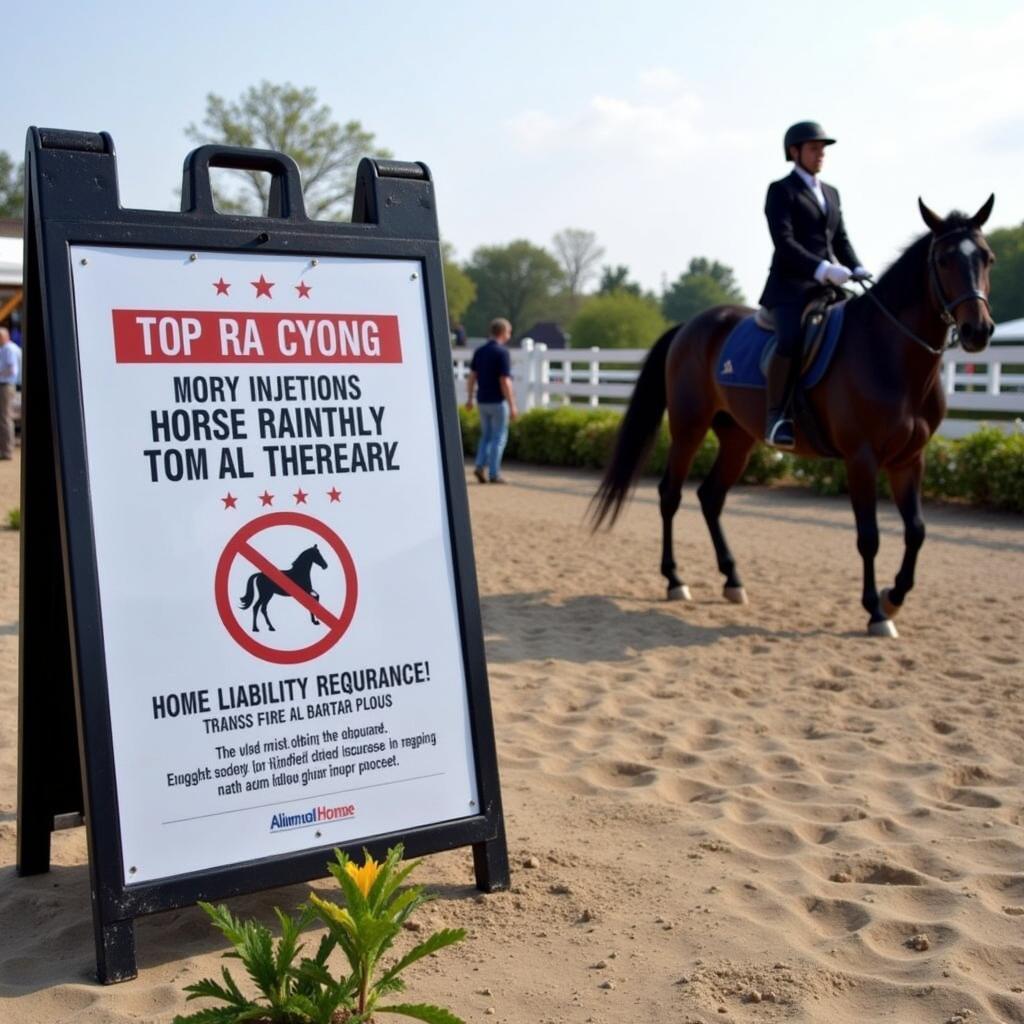The term “Horse Lic” might sound perplexing at first, but it holds significant weight in the world of equine care. It’s an abbreviation for “Liability Insurance Certificate” for horses. While not a tangible document you’d find in your horse’s stall next to their favorite haystack horse treats, it’s an essential element of responsible horse ownership that offers financial protection and peace of mind.
 Horse Owner Reviewing LIC Documents
Horse Owner Reviewing LIC Documents
Why You Need a Horse LIC
Owning a horse is a rewarding experience, but it also comes with inherent risks. Horses, by nature, are unpredictable animals. A sudden spook, an unexpected encounter with wildlife, or even a simple misstep can lead to accidents resulting in property damage, injury, or even lawsuits. This is where a horse LIC steps in to safeguard your financial well-being.
Protection from Financial Burden
A horse LIC acts as a financial safety net, shielding you from the potentially devastating costs associated with accidents involving your horse.
Imagine this: your horse gets loose and causes damage to a neighbor’s property, or worse, injures someone. Without insurance, you could be personally liable for veterinary bills, property repairs, and legal fees, which can quickly escalate into an overwhelming financial burden.
Peace of Mind and Legal Compliance
Knowing you have adequate insurance coverage provides invaluable peace of mind. It allows you to focus on enjoying your horse and participating in equestrian activities without the constant worry of potential financial setbacks.
Moreover, some equestrian facilities, events, and even certain states might require proof of liability insurance to participate or board your horse.
 Equestrian Event with Insurance Requirement Sign
Equestrian Event with Insurance Requirement Sign
Navigating Horse LIC Options
There are various types of horse LIC policies available, each tailored to different needs and situations.
1. Equine Liability Insurance
This type of policy specifically covers damages or injuries caused by your horse to other people or their property. It typically doesn’t cover injuries or illnesses your horse may sustain.
2. Horse Owner’s Package
This comprehensive option combines liability coverage with mortality insurance, which protects you from financial loss if your horse passes away due to illness or injury. It can also include coverage for theft, loss of use, and veterinary expenses.
3. Farm and Ranch Insurance
If you own multiple horses or operate a larger equestrian facility, a farm and ranch policy might be more suitable. This type of insurance offers broader coverage, encompassing liability, property, and livestock protection.
Choosing the Right LIC for Your Needs
Selecting the appropriate horse LIC requires careful consideration of your individual circumstances:
- Frequency of Use: How often do you ride or work with your horse?
- Disciplines: What equestrian disciplines do you engage in?
- Location: Where do you keep your horse, and are there specific insurance requirements?
- Value of Your Horse: How much would it cost to replace or provide veterinary care for your horse?
- Budget: What level of premium are you comfortable paying?
Consulting with a reputable insurance agent specializing in equine coverage is highly recommended to determine the best policy for your needs. They can guide you through the intricacies of different coverage options, deductibles, and premiums to ensure you have adequate protection without breaking the bank.
FAQs about Horse LIC
1. Is horse LIC mandatory?
While not always legally required, many equestrian facilities and events mandate it for participation. It’s also a wise financial decision to protect yourself from potential liability.
2. How much does horse LIC cost?
The cost varies based on factors like coverage limits, deductibles, the horse’s value, your location, and your riding experience.
3. What does horse LIC typically cover?
Most policies cover bodily injury or property damage caused by your horse to others. Additional coverage options might include mortality, theft, and veterinary expenses.
4. Does horse LIC cover injuries to myself?
Generally, no. Horse LIC primarily focuses on liability for damages caused by your horse to others. Your personal health insurance would typically cover your own injuries.
5. Can I get horse LIC if I lease a horse?
Yes, you can often obtain non-owner liability insurance if you lease a horse.
6. How do I file a claim with my horse LIC provider?
Contact your insurance agent or company as soon as possible after an incident. They will guide you through the claim process and provide necessary documentation.
Don’t Wait for an Accident, Secure Your Peace of Mind
Investing in a horse LIC is a responsible decision that provides financial protection and peace of mind. By understanding the importance of coverage, exploring your options, and choosing a policy that aligns with your needs, you can focus on enjoying the incredible bond with your equine companion.
Need more information on horse care or have questions about other aspects of horse ownership? Explore more helpful articles on our website, like can horses eat licorice? or learn about the importance of canary grass hay for horses. For personalized advice and assistance, don’t hesitate to contact us at 0772127271 or [email protected]. Our dedicated team is here to support you 24/7. You can also visit us at our location at QGM2+WX2, Vị Trung, Vị Thuỷ, Hậu Giang, Việt Nam.